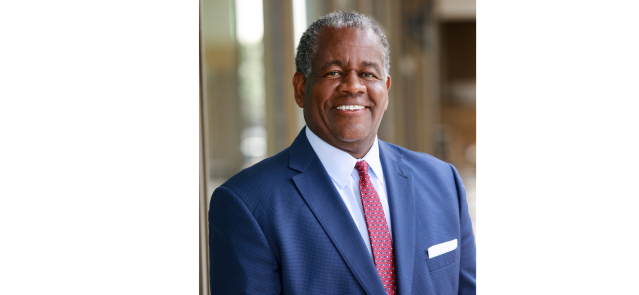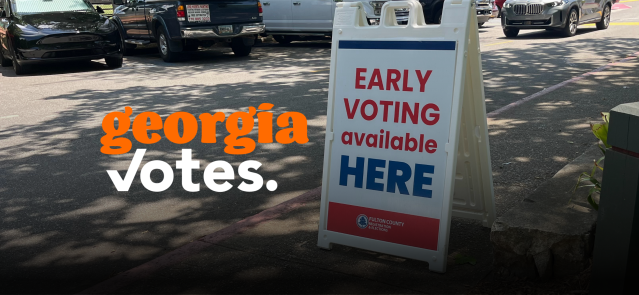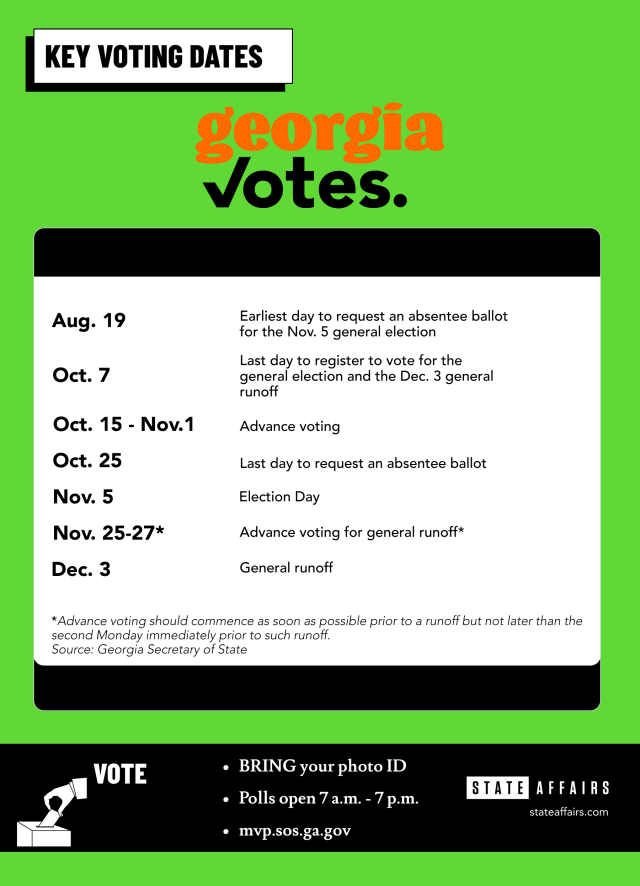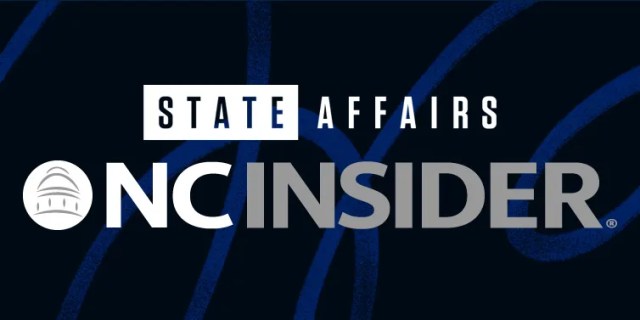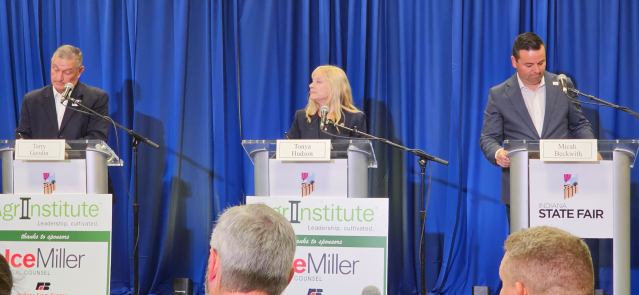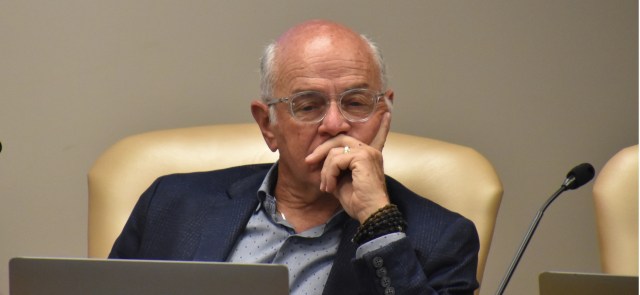YOU DON’T SAY
“This makes sense for the hospitals, their patients and their communities.”
Gov. Roy Cooper, at a news conference where he said that all 99 qualifying hospitals have committed to a debt-elimination effort. (The Associated Press, 8/12/24)
Prisoner Reentry
The Associated Press, 8/13/24
A new state panel has laid out specifics designed to bring numerous North Carolina state government agencies together to work on improving outcomes for prisoners when they are released, leading to reduced recidivism.
The Joint Reentry Council created by Gov. Roy Cooper’s executive order in January approved last week a plan to meet more than two dozen objectives by using over 130 different strategies.
The order directed a “whole-of-government” approach, in which Cabinet departments and other state agencies collaborate toward meeting goals and take action.
More than 18,000 people are released annually from the dozens of North Carolina adult correctional facilities and face challenges brought by their criminal record to employment, education, health care and housing.
The council’s plan “lays out our roadmap to help transform the lives of people leaving prison and reentering society while making our communities safe,” Cooper said in a news release Tuesday.
Cooper’s order also aligned with the goals of Reentry 2030, a national effort being developed by the Council of State Governments and other groups to promote successful offender integration. The council said North Carolina was the third state to officially join Reentry 2030.
The plan sets what officials called challenging goals when unveiled in January. It also seeks to increase the number of high school degrees or skills credentials earned by eligible incarcerated juveniles and adults by 75% by 2030 and to reduce the number of formerly incarcerated people who are homeless by 10% annually.
Several initiatives already have started. The Department of Adult Correction, the lead agency on the reentry effort, has begun a program with a driving school to help train prisoners to obtain commercial driver’s licenses. The Department of Health and Human Services also has provided $5.5 million toward a program helping recently released offenders with serious mental illnesses, Cooper’s release said.
The governor said in January there was already funding in place to cover many of the efforts, including new access to federal grants for prisoners to pursue post-secondary education designed to land jobs once released. [Source]
Ballot Access
Kyle Ingram and Emmy Martin, The News & Observer, 8/13/24
U.S. District Judge Terrence Boyle granted an emergency injunction on Monday directing the North Carolina State Board of Elections to certify the “Justice for All” party and place its candidates on the ballot in November.
The decision comes after three party supporters sued the elections board after it declined to recognize the party, foreclosing the possibility of getting its presidential candidate, left-wing academic Cornel West, on the 2024 presidential ballot. The board’s Democratic majority voted against JFA earlier this month after raising concerns about misleading petition gatherers and signers who asked for their signatures to be removed. The board also said an investigation into potentially fraudulent signatures is ongoing.
“In declining to certify JFA as a new political party, the board has categorically excluded JFA and its candidates from the ballot,” Boyle wrote in his order. “As a result, the board has precluded those voters who wish to associate with both from exercising their First Amendment right to do so. That is a severe burden on First Amendment rights.”
Boyle’s decision means West will be allowed to appear as a presidential candidate on North Carolina’s November ballot.
The lawsuit, filed in federal court, accused the board of violating the party members’ “core First Amendment rights as voters and citizens who wish to grow and develop a new political party in North Carolina.” Party supporters also accused the board of violating their due process rights by failing to provide them with specific evidence to discredit the signatures they provided in their petition campaign for ballot access.
The board cited issues with petition gathering and potential fraud in the party’s signature collection process.
Boyle made the decision after hearing arguments from attorneys Mary Carla Babb, representing the State Board of Elections, and Phillip Strach, who represented the plaintiffs, on July 30 in Elizabeth City.
Though West is running as a left-wing candidate, the party’s supporters were represented in court by Strach, a prominent conservative attorney. Strach frequently represents the state’s Republican legislative leaders in court and has recently defended them in gerrymandering lawsuits and challenges to stricter election laws.
The state Republican Party commended the court on Tuesday morning for its ruling. “This partisan board failed the people of North Carolina for months abusing the certification process. Now, these contests will be decided where they should: by the citizens of our great state,” NC GOP Communications Director Matt Mercer said in a statement.
The court’s ruling could be appealed, but time is running out for any further changes to ballots. The ballot printing process begins in mid-August and the first absentee ballots are sent out to voters on Sept. 6. [Source]
Transit Tax
Steve Harrison, WFAE Radio, 8/13/24
The town of Matthews appears to be dead-set against Charlotte’s proposed transportation and transit plan, and commissioners voted unanimously Monday night to oppose designs that call for the town to get a bus line instead of a new light rail.
The city of Charlotte is launching an effort to build support for a new transit authority to run the region’s public transportation system, and a new one-cent sales tax referendum to pay for transportation improvements. They unveiled a proposed bill to do so last week. For years, Charlotte had said it would build the Silver Line light rail from uptown to Matthews. But to please Republican lawmakers in Raleigh, Charlotte agreed this spring to only spend 40% of new tax money on rail transit.
With less money for trains, Charlotte quietly told Matthews officials in May it would build bus rapid transit to connect Matthews to uptown instead. Matthews commissioners are livid.
Ken McCool said he had been to “countless” public meetings on the Silver Line light rail over the last decade.
“How many public meetings have they hosted when they decided they wanted to change it to bus rapid transit? Zero. Not a single constituent has been heard,” he said. “Not a single person has been into a public building and talked about this and been able to voice their opinions. Not a single one.”
Charlotte Mayor Vi Lyles and City Manager Marcus Jones have not publicly said the Silver Line’s eastern leg is out. Other officials have widely discussed that it’s not viable, from the city’s perspective at least.
Matthews Mayor John Higdon said he’s skeptical that true bus rapid transit would be built.
Matthews commissioners voted three days after Charlotte officials unveiled a bill written for lawmakers in Raleigh that would create a new countywide transit authority. The bill would also let Mecklenburg County place a sales tax increase referendum on the ballot in November 2025.
Matthews commissioners instead have proposed either a higher sales tax increase to fund the whole Silver Line — or that all new proposed train lines be swapped out for better bus service. [Source]
Voter ID
Will Doran, WRAL News, 8/13/24
Student photo identification cards from Duke and Campbell universities are now among the list of approved IDs that can be used during this year’s elections.
The State Board of Elections approved a dozen new IDs Tuesday, adding the Duke Card, the Campbell student voter ID and 10 others to the list of more than 120 acceptable IDs approved for voters. Many other colleges and universities have already had IDs approved.
But the board didn’t approve an electronic ID card that some UNC-Chapel Hill students use because one of the board’s Republican members objected to that option. The elections board now plans to hold a meeting later this month to discuss the Chapel Hill virtual IDs in more detail, then take a vote on whether to accept them. The physical ID card used by UNC students has been approved already.
Many state and government agencies have also gotten approval for their employees to be able to use their work IDs as photo identification for voting. Among those newly added on Tuesday were the North Carolina Department of Administration, Guilford County Schools and the City of Gastonia.
Most North Carolinians have driver’s licenses and should be able to show those when they go to vote. But poll workers won’t be allowed to accept licenses that have been expired for more than a year — so the expanded list of other acceptable IDs could make it less likely for people to be thwarted when they go to vote.
State law dictates that everyone should be allowed to fill out a ballot if they show up at the polls, even if they don’t have an ID. But the state doesn’t have to count those ballots; the voters will be asked to fill out a form explaining why they don’t have an ID. Their votes will only be counted if their excuse is acceptable.
In the primary this March, 473 voters had their ballots thrown out because of ID problems, WRAL reported, out of 1.8 million total voters.
North Carolina Republicans have been trying to enact voter ID rules for more than a decade, but this November’s presidential election is the first major election in which IDs will be required. A 2013 voter ID law was struck down as unconstitutional for racial discrimination. So was a subsequent 2018 law. But in 2022 a new GOP majority on the state Supreme Court reversed that precedent and allowed voter ID to go into use.
Those rules were first used in the 2023 municipal elections and then in this year’s primaries — each of which most North Carolina voters skipped. So the November general election is expected to feature the first widespread use of the new rules.
More details on what types of IDs have been approved, and what exceptions to the rules exist, can be found on the State Board of Elections website. [Source]
Superintendent Race
Laura Leslie and Emily Walkenhorst, WRAL News, 8/13/24
North Carolina’s race for state schools superintendent is once again in the national spotlight after an unearthed social media video by Republican candidate Michele Morrow called for a military intervention to keep former President Donald Trump in office in 2021.
In interviews with WRAL News on Tuesday Morrow denied calling for a military coup. Her opponent, Democrat Mo Green, says she’s unfit to run the state’s K-12 public schools.
The video was one Morrow posted on social media on Jan. 6, 2021, after she attended the rally that turned violent at the U.S. Capitol.
In the video, Morrow called on then-President Donald Trump to use the Insurrection Act to activate the military and put “the Constitution to the side” in order to stay in power.
“They can all be arrested for treason,” Morrow said in the 2021 video. “And if the police won’t do it and the Department of Justice won’t do it, then he will have to enact the Insurrection Act, in which case the Insurrection Act completely puts the Constitution to the side and says, ‘Now the military rules all.’”
On Tuesday, Morrow said she didn’t ask for people to be arrested for treason.
“My words were not to arrest people for treason,” she said. “I was stating that when our government is not protecting the God-given inalienable rights of our citizens, that it is our duty to make sure that they understand that they work for us.”
She continued: “I thought that it was time for us, as we the people, to stand up and say, ‘You guys work for us,’ because I believe everybody that’s an elected official works for the people of the United States of America, and government doesn’t give us our freedoms. It’s actually God-given inalienable rights, right?”
Morrow went to the Jan. 6, 2021, protest with her children. She says they didn’t take part in any of the violence that day.
Green, in an interview with WRAL on Tuesday, said Morrow’s comments were “deeply concerning and incredibly dangerous.” He pointed out that Morrow has also called for the executions of Presidents Barack Obama and Joe Biden in the past, which WRAL has previously reported.
Green said he was concerned Morrow is running to become the head of the Department of Public Instruction, charged with taking care of the state’s 1.5 million public schoolchildren.
Since winning the Republican primary for state superintendent, Morrow has scrubbed much of her social media, deleting one of her accounts on X, the platform formerly known as Twitter. [Source]
Offender Registration
Peter Castagno, Port City Daily, 8/12/24
Three judges on the Fourth Circuit of Appeals unanimously upheld the constitutionality of North Carolina’s sex offender registry statute against a lawsuit from two organizations based in the state.
The National Association for Rational Sexual Offense Laws, headquartered in Raleigh, and its state-affiliate North Carolina for Rational Sexual Offense Laws joined anonymous plaintiffs John Doe 1 and 2 in the case. Plaintiffs first sued in 2017 to challenge amendments in the state’s sex offender registration statute and reduce sex offender restrictions and the length of registration terms. The groups argued state law is excessively punitive and fails to protect public welfare.
North Carolina’s law prohibits registered offenders from employment in positions supervising or involving children and restricts visitation and residence near areas such as playgrounds or schools. Sex offenders are registered for 30 years but can petition to end registration after 10 years. Severe offenses can be punished with lifetime registration.
Chief Judge Albert Diaz wrote the majority opinion after the court reviewed evidence regarding recidivism rates and limited opportunities for sex offenders. Judges found the requirements are not excessively punitive and provide important public safety benefits.
Attorney General Josh Stein — who is running for governor in 2024 — and three district attorneys, Lorrin Freeman, Sean Boone, and Reece Saunders, represented North Carolina.
“I’m pleased the court has upheld the constitutionality of this law, which protects children and families from people convicted of serious sexual offenses,” Stein said in a Friday press release. “The law was written to keep North Carolinians safe, and I’m proud of the hard work my office put in to defend it.” [Source]
Lazzara Fellowship
The (Jacksonville) Daily News, 8/13/24
The Council of State Governments has announced that Senator Michael Lazzara, R–Onslow, has been selected to participate in the 2024 CSG Henry Toll Fellowship. Bringing together 49 individuals representing 34 states and U.S. territories and all three branches of state government, the Henry Toll Fellowship is the nation’s premier leadership development program for state government officials, according to a Tuesday press release from Lazzara’s office.
“I am deeply honored to have been selected for this prestigious fellowship,” Lazzara said. “This opportunity will allow me to collaborate with leaders from across the nation, sharing ideas and learning new approaches to better serve the people of North Carolina. I look forward to bringing back valuable insights that will help us make Onslow County the best place to live, work, and raise a family.”
Since 1986, CSG has annually convened a new class of Henry Toll fellows at its national headquarters in Lexington, Kentucky for an intensive leadership boot camp. The program’s sessions are designed to stimulate personal assessment and growth, empower leaders to collaborate and communicate more effectively, and provide nonpartisan networking and relationship-building opportunities.
“While the CSG Henry Toll fellows come from every region of our nation, from both political parties and all three branches of state government, they share one thing in common – they are all committed to improving the lives of the people they serve,” said CSG Executive Director and CEO David Adkins, a former Kansas state senator and 1993 CSG Henry Toll Fellow alumnus.
The Toll Fellowship honors the founder of CSG, Henry Toll, who as a former state senator from Colorado, was the driving force behind the creation of CSG in 1933.
There are over 1,400 graduates of the Toll Fellowship, including four sitting state/territorial house speakers, eight sitting state supreme court justices, 10 sitting members of Congress, three sitting governors and more than 200 Toll alumni currently serving as state/territorial legislators. [Source]
Harris Event
Danielle Battaglia, McClatchy, 8/13/24
Vice President Kamala Harris plans to visit Raleigh Friday to discuss her plans to bolster the economy and prevent price gouging, a campaign official told McClatchy. Her visit will be her eighth this year to North Carolina, which is considered a battleground state in the presidential election. No further details have been announced.
The Democratic candidate for president and her new running mate, Minnesota Gov. Tim Walz, were scheduled to visit Raleigh as part of a tour of swing states. But they were forced to postpone due to Tropical Storm Debby. The powerful storm dumped rain, spurred up 10 tornadoes and left four people dead in North Carolina.
A new date for a rally has not been rescheduled.
Harris’ visit will follow former President Donald Trump’s visit to Asheville on Wednesday. There, the Republican nominee plans to discuss how the Biden administration has harmed North Carolinians with prices that “are excruciatingly high,” and a cost of living that “has soared.”
This marks a rare visit for Trump to North Carolina in a year that has included a rally in Charlotte and his attendance at a NASCAR race in Concord.
Ohio Sen. JD Vance, Trump’s running mate, also was scheduled to visit Raleigh last Thursday to speak with media, but the weather postponed the trip. A visit hasn’t been rescheduled. [Source]
Flooding Relief
Jennifer Allen, Coastal Review, 8/13/24
After a year of record coastal flooding, eastern North Carolina may feel a slight reprieve from high-tide flooding days between now and April 2025.
The National Oceanic and Atmospheric Administration’s National Ocean Service last week released its 2024-25 Annual High-Tide Flooding Outlook, which projects slightly fewer of these flooding days through spring 2025 than last year. That’s because El Niño conditions are transitioning to La Niña conditions, and these two opposing climate patterns in the Pacific can affect weather worldwide.
“Bottom line: Over the past year, we’ve seen record coastal flooding, or high-tide flooding, along our coastlines,” Nicole LeBoeuf, National Ocean Service director, during the Aug. 6 online news briefing, said. “When the ocean runs hot, sea levels run high, and we see that playing out in our coastal flooding data.”
The outlook recaps high-tide flooding events from May 2023 to April of this year at 97 NOAA tide gauges along the U.S. coast, and it projects what to expect at these locations through April 2025. High-tide flooding, which is sometimes called nuisance or sunny-day flooding, happens when tides reach anywhere from 1 to 2 feet above the daily average high tide, and cover what is typically dry land along the coast. “As sea levels continue to rise, high-tide flooding occurs more frequently, even without severe weather,” she said.
For the 2023-24 season, coastal communities in the United States experienced seven to eight flood days, LeBoeuf said. In 2023, 34 locations broke or tied their records for flood days, which she called “a dramatic increase” from the previous year.
Hot ocean temperatures led to the highest levels of sea level measurement on record. There were 44 NOAA tide gauge locations, mostly on the East Coast, that broke or tied their previously recorded sea levels to date. This means “we got an additional 6 inches of sea level rise and five median coastal flood days annually compared to the year 2000, roughly a 200% increase,” LeBoeuf said. [Source]
Jewelry Insurance
Kevin Ellis, Business NC, 8/13/24
A Wisconsin-based jewelry insurance company will invest $5.8 million and create 200 jobs in Raleigh that pay on average $169,592, more than twice the current average wage for Wake County.
Jewelers Mutual Group, which provides insurance protection to jewelry businesses and consumers will create an “innovation hub” to serve online customers. Based in Neenah, Wisconsin, south of Green Bay, the company started its search for a new office with about 15 cities, according to the state.
The decision came down to Dallas or Raleigh, with North Carolina winning out because of available talent, education systems, tax climate, real estate costs and more.
“North Carolina is a hotbed of technology innovation, and I’m pleased to see a well-respected company like Jewelers Mutual recognize our strengths and decide to grow their business in our state,” said Gov. Roy Cooper in a statement.
Jewelers Mutual was founded in 1913 and has more than 1 million customers nationwide and in Canada. The company serves jewelry businesses and provides customer service through insurance and technology. Jewelers Mutual also has offices in Dallas and Miami.
The company expects to employ 200 people in North Carolina over the next five years and make its $5.85 million investment by Dec. 31, 2025. Jewelers Mutual’s project in North Carolina will be facilitated, in part, by a $2.4 million Job Development Investment Grant approved by the state’s Economic Investment Committee earlier Tuesday. That state money will be spread out over 12 years.
Wake County and Raleigh will also provide almost $147,000 in incentives. Workforce and community college assistance, $764,000, brings the total state incentive package to almost $3.2 million.
The Texas incentive package was valued at $3 million, according to the N.C. Department of Commerce. [Source]
COVID Rise
Freya Gulamali, The News & Observer, 8/13/24
Nationally, COVID-19 levels are rising. More than half of states in the U.S., including North Carolina, are reporting “very high” levels of SARS-CoV-2 viral activity in wastewater. At least 27 states are reporting “very high” levels of the virus that causes COVID-19 in their wastewater, and an additional 17 are reporting “high” levels, according to the latest update from the Centers for Disease Control and Prevention.
Wastewater levels are “the proverbial canary in the coal mine,” said Dr. David Wohl, professor of medicine in the Division of Infectious Diseases at the University of North Carolina School of Medicine.
“What it tells us is how much COVID-19 is out there.” Dr. David Weber, medical director of the Department of Hospital Epidemiology at UNC Health, said wastewater levels are particularly important in measuring “the amount of virus that’s out in the community for people who are mildly ill and not seeing a physician at all.”
Generally, many viruses “survive better at low temperatures and low humidity,” Weber said. The CDC National Wastewater Surveillance System dashboard shows that wastewater levels of COVID-19, though, are quickly approaching levels found during the winter months. Weber says there are three reasons for these high levels in August.
First, when a new variant appears in the summer, Weber said, it “hasn’t fallen into the typical winter cycles yet that we see with other viral diseases.” The new variants this summer are “not, in general, more likely to cause severe disease, but [they are] more transmissible.” He said that’s why wastewater levels of COVID-19 are higher, but people infected with new strains of COVID-19 are “not sicker than in previous waves.”
COVID-19 rates are also rising because of waning immunity since “many people have not received recent boosters,” Weber said. “Vaccines prevent infections for about three months. They prevent serious disease for about six months.”
He expects new vaccines targeting the new variants to arrive by the end of the month. “As soon as it’s available, people should get the vaccine, and because most people at least have some previous immunity, the vaccine should rapidly give them some protection,” Weber said.
Weber also cites the absence of masks as another reason for rising wastewater levels. “The mask can be protective in how many particles you expel,” said Weber. “Anyone who feels particularly at risk can wear a mask.” [Source]
Utility Shooting
Jay Price, WUNC Radio, 8/13/24
A U.S. Army Special Forces colonel will not face charges after he fatally shot a utility worker in May, authorities said. The shooting took place outside the unnamed soldier’s home near Carthage. Moore County District Attorney Mike Hardin said the soldier’s actions were justified under the North Carolina Castle Doctrine. That law allows defensive force when there’s a perceived threat within one’s home or property.
The worker, Ramzan Daraev, was surveying utility poles for a fiber optic construction project and taking photos of individual poles, some with the soldier’s home in the background. Daraev was a Russian citizen and an ethnic Chechen.
In the first of two 911 calls, at 8:12 p.m. on May 3, the soldier’s wife said she thought he was taking photos of their children and house. She asked for law enforcement help.
Investigators from the Moore County Sheriff’s Office said the soldier, initially unarmed, approached Daraev to ask what he was doing. The soldier went back to his house to get a handgun and walked back to Daraev to keep an eye on him while a deputy was on the way.
Then, in a second more frantic call, at 8:25 p.m., the woman said her husband badly needed law enforcement help, and she yelled for someone to get her a rifle.
“The confrontation escalated when Daraev reportedly became agitated and lunged at the homeowner after repeatedly refusing to leave the property,” said a Sheriff’s Office’s news release. “The homeowner reported firing several shots in response to Daraev’s advance. Under the North Carolina Castle Doctrine, the homeowner’s actions are protected, providing legal justification for using defensive force.”
Daraev entered the U.S. in 2022 over the southern border. His nationality — and the fact that the soldier is a Special Forces officer — sparked Internet conspiracy theories about Russian espionage. But investigators say there was no question he was doing work for the utility project; a Moore County deputy actually had seen him earlier in the day at another location and asked what he was doing. Daraev’s English was so poor that the deputy had to use a phone app to translate their conversation.
According to the news release, Daraev had nothing to identify him as a utility worker. The Sheriff’s Office said Daraev was not armed and had nothing with him except a cell phone when law enforcement arrived on the scene after the shooting.
The investigation found confusing relationships between the companies involved in the fiber optic project. The local utility company, Brightspeed, was working with a New Jersey company called Utilities One to survey the area. The investigation found Daraev was doing work for a subcontractor to Utilities One called Cable Warriors, but the two companies were related. Utilities One didn’t return calls seeking comment.
The Sheriff’s Office said it received several reports after the shooting of people being seen on private property in same general area earlier in the evening. According to the release, those people were likely part of the group working with Daraev.
“None of the citizens making those reports were aware that the persons they observed on their properties were conducting utility work,” the release said.
The Sheriff’s Office said in the news release it had requested an investigation by the N.C. Labor Department into things like the safety practices for workers involved in the broadband project. A Labor Department spokesperson said Tuesday it had closed its investigation because Daraev appeared to be an individual contractor rather than an employee of one of the companies involved. [Source]
Transportation Funding
Glyniss Wiggins, WNCN News, 8/13/24
The state’s gas tax has been the main way for the North Carolina Department of Transportation to maintain roads and bridges and other means of travel. However, the state’s motor fuels tax — accounting for 43 percent of N.C. revenue — is becoming less stable and reliable with the rise of electronic or hybrid vehicles.
Now, the state is partnering with the Eastern Transportation Coalition, a multistate membership that explores sustainable, long-term funding options that better support the demands of growing states and their transportation network.
Transportation leaders are discussing these issues as the state moves towards a more equitable economy, under Executive Order 246 signed by Gov. Roy Cooper in 2022. As part of this order, NCDOT created the N. C. Clean Transportation Plan to help guide a better approach to expanding clean-energy infrastructure. [Source]
Public Comment
News Release, 8/13/24
The North Carolina Department of Health and Human Services’ Division of Child and Family Well-Being’s Community Nutrition Services Section has posted a Prospective Waiver for the Child and Adult Care Food Program (CACFP) for public review and comment.
The waiver will streamline the process for NC CACFP to authorize alternative methods of meal service in the At-Risk Afterschool component of CACFP when standard meal service operations are limited due to a variety of circumstances such as natural disasters or unscheduled major building repairs.
The public is invited to review and comment on the waiver, which is available online here.
The public review and comment period is Aug. 13-Sept. 13, 2024.
Tourist Spending
WBTV News, 8/13/24
North Carolina tourists spent $35.6 billion in 2023, the governor’s office reported Tuesday. That growth followed a record-breaking increase of 15% in 2022. Additionally, direct tourism employment increased by 4.8% to 227,000. According to the study, N.C. hosted about 43 million visitors in 2023.
“It’s great to see increasing numbers of people continue to flock to North Carolina to see all we have to offer,” said Gov. Roy Cooper. “Visitors are investing record amounts of money bolstering our booming tourism industry, and that brings good jobs and income to North Carolina businesses and families.”
98% of N.C.’s counties saw increases in spending compared to 2022. Nearly 20% of counties saw higher-than-average growth; Camden led with a 10% increase. Mecklenburg had the largest number of direct tourism employees (36,310), an 8% increase from 2022.
Visitors spent more than $97 million per day in North Carolina. That spending adds $7.1 million per day to state and local tax revenues. [Source]
Manhunt
Tammy Grubb, The News & Observer, 8/13/24
The state Department of Adult Correction offered a $25,000 reward Tuesday evening as the search continued for an inmate serving a life sentence for murder who escaped custody in Orange County.
“We know there are people out there who know where he is and probably have information to share,” said Keith Acree, spokesman for the department. “We are hoping that this will be the carrot that draws them out and provides information that will lead to his capture.”
At least 114 local, state and federal law enforcement officers were going door to door and combing through woods, creeks and ravines Tuesday evening for 30-year-old Ramone Alston, who escaped after arriving at UNC Hospitals in Hillsborough for medical care.
The search covers 580 acres, including the one-mile area surrounding the hospital, Orange County Emergency Services Director Kirby Saunders said.
Agencies across North Carolina are also on the lookout for Alston, who was still in handcuffs when he fled around 7 a.m., Acree said. Alston is considered dangerous, the Orange County Sheriff’s Office said.
Alston fled as two state corrections officers were removing him from a prison van at the hospital’s rear entrance Tuesday. He “broke away from the officers in the parking lot and ran to the woods,” Acree said.
Officials said he may have removed his leg restraints during the ride to the hospital. “We are working diligently to follow all the leads that we have,” Orange County Sheriff Charles Blackwood said, declining to be more specific.
His office is also focused on reassuring the Hillsborough community that it is safe, he said. There had been no reported sightings of Alston since early Tuesday morning, he said. “As far as the community goes, there’s two ways of looking at this. He’s either in a five-mile radius or he’s in the rest of the world, and we’re searching both,” Blackwood said.
Todd Ishee, secretary of the N.C. Department of Adult Correction, appeared with Blackwood at a news conference Tuesday afternoon. “Our staff will be on duty 24 hours a day, seven days a week, until offender Alston is returned to custody,” Ishee said. Blackwood and Ishee did not elaborate on how Alston got free from his leg restraints, but noted the investigation into his escape will consider all the details of what happened from the time they left the prison in Bertie County to the time Alston escaped, including whether the officers may have been involved. [Source]
Readers’ Choice
News Release, 8/13/24
The North Carolina Zoo has claimed the top spot in a nationwide contest for “Best Zoo” in the United States. The North Carolina Zoo was first nominated in the Newsweek Readers’ Choice Awards in July 2024, with public voting open daily from July 3-31. Contest nominees were proposed and vetted by a panel of travel writers and tourism experts before a final voting selection was made by Newsweek editors. Top-10 results were made public on Aug. 8, with North Carolina Zoo winning the top spot.
Named
News Release, 8/13/24
Jacob Brown is the new park superintendent at Raven Rock State Park in Harnett County, the N.C. Division of Parks and Recreation announced Tuesday. Brown succeeds John Privette, who became the division’s law enforcement specialist last year. Park superintendents manage operations and administration at a park and have wide-ranging responsibilities that include staffing, training, law enforcement, planning, resource management, interpretation and education, and visitor services. Brown grew up in Cameron, N.C., and visited Raven Rock State Park frequently as a child. He has a bachelor’s degree in recreation management and biology from Appalachian State University.
NC Insider Legislative Report
LB: LEGISLATIVE BUILDING. LOB: LEGISLATIVE OFFICE BUILDING
HOUSE CALENDAR
Monday, Sept. 9, 2024
House Convenes at 12 P.M.
SENATE CALENDAR
Monday, Sept. 9, 2024
Senate Convenes at 12 P.M.
HOUSE & SENATE: Reconvening allowed under provisions of SB 916, if no sine die adjournment previously adopted.
- Monday, Sept. 9 to Wednesday, Sept. 11
- Wednesday, Oct. 9
- Tuesday, Nov. 19 to Friday Nov. 22
- Wednesday, Dec. 11 to Friday Dec. 13
Legislative Studies and Meetings
LB: LEGISLATIVE BUILDING. LOB: LEGISLATIVE OFFICE BUILDING
Thursday, August 22
- 2 p.m. | America’s Semiquincentennial Committee, 1228/1327 LB
Thursday, August 29
- 1 p.m. | Agriculture and Forestry Awareness Study Commission, Ed Emory Auditorium, Kenansville.
N.C. Government Meetings and Hearings
BOLD ITEMS ARE NEW LISTINGS
Wednesday, Aug. 14
- 9 a.m. | North Carolina Real Estate Commission Meeting, 1313 Navaho Drive, Raleigh.
Monday, Aug. 19
- 2 p.m. | The Executive Committee of The North Carolina Partnership for Children meets, The meeting will be held via Zoom. You may contact Yvonne Huntley at 984.221.1242 or email at [email protected] for additional information.
Tuesday, Sept. 3
- 1:30 p.m. | The Executive Committee of The North Carolina Partnership for Children meets, The meeting will be held via Zoom. You may contact Yvonne Huntley at 984.221.1242 or email at [email protected] for additional information.
Friday, Sept. 6
- 10 a.m. | The Executive Committee of The North Carolina Partnership for Children meets, The meeting will be held via Zoom. You may contact Yvonne Huntley at 984.221.1242 or email at [email protected] for additional information.
Tuesday, Sept. 10
- 8:30 a.m. | The Executive Committee of The North Carolina Partnership for Children meets, The meeting will be held via Zoom. You may contact Yvonne Huntley at 984.221.1242 or email at [email protected] for additional information.
Tuesday, Sept. 17
- 10 a.m. | The Executive Committee of The North Carolina Partnership for Children meets. You may contact Yvonne Huntley at 984.221.1242 or email at [email protected] for additional information.
UNC Board of Governors
23 S. WEST STREET, SUITE 1800, RALEIGH
Wednesday, Sept. 11
- Meeting of the Board of Governors, TBA.
Thursday, Sept. 12
- Meeting of the Board of Governors, TBA.
Thursday, Oct. 17
- Meeting of the Board of Governors, TBA.
Wednesday, Nov. 13
- Meeting of the Board of Governors, TBA.
Thursday, Nov. 14
- Meeting of the Board of Governors, TBA.
N.C. Utilities Commission Hearing Schedule
DOBBS BUILDING, 430 NORTH SALISBURY STREET, RALEIGH
Wednesday, Aug. 14
- 7 p.m. | Public Witness Hearing – Application for General Rate Increase for Piedmont Natural Gas Company, Inc. | G-9 Sub 837
Tuesday, Aug. 20
- 6 p.m. | Public Witness Hearing – Application for Transfer of Public Utility Franchise and Approval of Rates of HISCO East, LLC in Carteret County to HISCO I in Carteret County | W-1297 Sub 17, W-1344 Sub 0
- 6 p.m. | Public Witness Hearing – Application for Certificate of Public Convenience and Necessity and for Approval of Rates to Provide Sewer Utility Service to Currently Served Cape Ponte Village Subdivision, Additional Phases for the National Park Service, Harkers Island RV Park and a Fe | W-1344 Sub 1
Wednesday, Aug. 21
- 7 p.m. | Public Witness Hearing – Application for General Rate Increase for Piedmont Natural Gas Company, Inc. | G-9 Sub 837
Thursday, Aug. 22
- 7 p.m. | Public Witness Hearing – Application for General Rate Increase for Piedmont Natural Gas Company, Inc. | G-9 Sub 837
Other Meetings and Events of Interest
BOLD ITEMS ARE NEW LISTINGS
Wednesday, Aug. 14
- 10:30 a.m. | Gov. Roy Cooper to deliver remarks at Brightspeed Internet event celebrating expanded access to high-speed fiber internet in Eastern North Carolina, Rocky Mount High School.
- 3 p.m. | Gov. Roy Cooper to attend Guilford County Schools Right Start New Teacher Orientation and deliver remarks, Laughlin Professional Development Center, 7911 Summerfield Road, Summerfield.
Friday, Sept. 6
Friday, Sept. 27
- 2024 Lumbee Powwow, Lumbee Tribe Cultural Center, 638 Terry Sanford Drive, Maxton.

